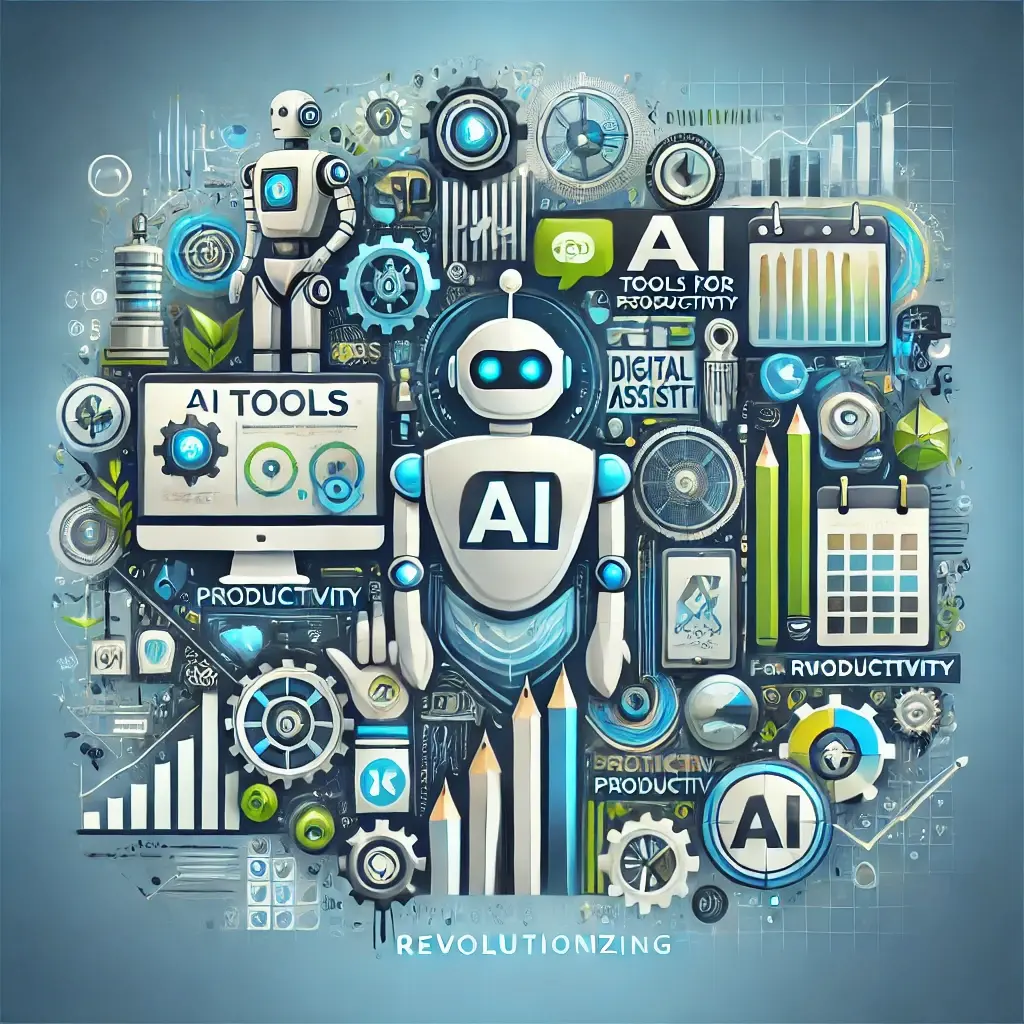
Artificial Intelligence (AI) has become indispensable for enhancing productivity and reshaping industries’ operations. AI tools are increasingly utilised to automate repetitive tasks, analyse vast amounts of data, and offer predictive insights. With the ability to streamline workflows, boost efficiency, and unlock new potential, AI tools are transforming how we work and how businesses interact with customers, manage resources, and make decisions.
From virtual assistants to advanced data analysis platforms, AI tools offer diverse solutions across various sectors, enabling individuals and teams to focus on higher-value tasks while leaving mundane, repetitive processes to machines. This article explores the different types of AI tools available today and how they are helping to boost productivity across industries.
The Rise of AI Tools for Productivity
To begin with, AI tools have seen rapid adoption due to their ability to improve efficiency. In the past, many industries relied heavily on manual processes, often prone to error and time-consuming. However, AI has revolutionised these processes by automating once labour-intensive tasks, freeing up valuable time for more strategic endeavours.
For instance, in fields like customer service, AI-powered chatbots such as Zendesk and Drift handle basic inquiries, route tickets and even solve everyday problems. These tools reduce the workload on human agents, allowing them to focus on more complex customer issues while providing faster and more efficient service to clients. As a result, businesses can maintain higher levels of customer satisfaction and lower operational costs.
Moreover, AI tools are particularly effective in data analysis. Platforms like IBM Watson and Google AI offer powerful machine learning algorithms that can sift through vast amounts of data, identify patterns, and generate actionable insights. This capability enables companies to make data-driven decisions, optimise their operations, and predict future trends, particularly useful in finance, healthcare, and marketing.
Categories of AI Tools for Productivity
Several categories of AI tools are designed to improve productivity, each offering unique capabilities tailored to specific tasks and industries.
- AI-Powered Virtual Assistants Virtual assistants like Siri, Google Assistant, and Amazon’s Alexa have become commonplace in personal and professional settings. These AI-driven tools help manage calendars, schedule meetings, send reminders, and even perform web searches. Additionally, they provide voice-activated convenience, allowing users to operate them hands-free, further enhancing productivity.
- Natural Language Processing (NLP) Tools NLP tools, such as Grammarly and Jasper, help users with content creation by offering real-time grammar checks, writing suggestions, and tone adjustments. They can also summarise lengthy documents and provide contextually accurate paraphrasing, making content creation more efficient and less time-consuming.
- AI-Driven Project Management Tools like Trello and Monday.com use AI to help teams manage projects more effectively by automating workflows, assigning tasks based on team capacity, and predicting project timelines. These tools ensure that projects are completed on time and within budget by streamlining team communication and automating task allocation.
- AI in Marketing Automation AI tools like HubSpot and Mailchimp have revolutionised how companies manage their marketing campaigns. These platforms can automate email marketing, analyse customer behaviour, and segment audiences based on preferences, allowing businesses to deliver personalised marketing messages that increase conversion rates.
- AI for Data Analysis Data-centric tools such as Tableau and IBM Watson employ AI to help businesses analyse large datasets, generate reports, and identify key trends. This ability to analyse vast amounts of information quickly and accurately is invaluable in industries such as finance, healthcare, and logistics, where data-driven decisions are critical.

Data Analysis in AI
How AI Tools Are Transforming Key Industries
AI tools drive transformative change across various industries, including healthcare, finance, education, and retail. Their impact reshapes traditional business models and offers innovative ways to solve longstanding problems.
In healthcare, AI tools are used to analyse patient data, diagnose diseases, and recommend treatment plans. For example, by analysing electronic health records, AI systems such as DeepMind Health can predict hospital patient deterioration. This improves patient outcomes and reduces the burden on healthcare providers.

AI Application in Healthcare – iStock image
In finance, AI-driven platforms like Alpaca and Kavout provide predictive insights into market trends, helping traders and financial advisors make better investment decisions. These tools analyse historical market data, assess risk factors, and offer recommendations based on complex algorithms, enhancing the precision and speed of financial decision-making.
The education sector also benefits from AI tools such as Duolingo and Coursera, which provide personalised learning experiences through adaptive algorithms. These tools assess individual learning styles and progress, offering tailored educational content to improve learning outcomes.
Finally, in retail, AI tools like Shopify’s Kit help small businesses manage their online presence, automate marketing efforts, and engage with customers. AI algorithms can recommend products to customers based on browsing history and previous purchases, boosting sales and enhancing the overall shopping experience.
AI Tools for Remote Work and Collaboration
The rise of remote work due to the global pandemic has accelerated the adoption of AI tools for collaboration and productivity. Tools like Slack, Microsoft Teams, and Zoom have incorporated AI features to help teams stay connected and productive, regardless of location.
For example, AI-powered transcription services integrated into platforms like Zoom automatically convert meeting discussions into written text, making it easier for teams to review conversations and track action items. These tools also provide features such as automatic scheduling, language translation, and real-time collaboration on shared documents.
As businesses continue embracing hybrid work models, AI tools will remain essential to ensuring seamless collaboration between remote and in-office employees.
Challenges and Opportunities with AI Tools
While AI tools offer numerous advantages, they also present certain challenges. One of the main concerns is data security and privacy. As AI tools handle sensitive data, ensuring that information is stored and processed securely is crucial. Additionally, the cost of implementing AI solutions can be a barrier for small businesses, though many AI tools offer scalable options tailored to different budget levels.
On the other hand, the opportunities for AI-driven productivity are vast. By automating routine tasks, AI tools can unlock human potential, allowing individuals to focus on more strategic and creative endeavours. Moreover, AI tools can help businesses remain competitive by providing insights that lead to better decision-making and operational efficiency.
The Future of AI Tools in Boosting Productivity
Looking ahead, the future of AI tools is promising. Advances in machine learning, natural language processing, and cloud computing will likely lead to even more sophisticated AI tools that can predict needs, recommend actions, and further reduce the manual burden of routine tasks.
As AI tools become more integrated into daily workflows, they will continue to shape the future of productivity in both personal and professional settings. Whether in healthcare, education, or marketing, the potential for AI tools to revolutionise industries is immense, and businesses that leverage these technologies will be well-positioned to thrive in an increasingly digital world.
As the world advances, one of the most significant game-changers in various industries is Artificial Intelligence (AI). Specifically, AI tools have become essential for boosting productivity, streamlining workflows, and automating repetitive tasks. More than just a futuristic concept, AI tools are being utilised today across numerous sectors, helping professionals optimise their time and energy. Furthermore, with the increasing demand for higher productivity, understanding and implementing AI tools can transform how we work, think, and deliver results.
What Are AI Tools for Productivity?
Firstly, it’s crucial to grasp what AI tools are and how they apply to productivity. AI tools are software applications that use machine learning, natural language processing, and automation to assist in decision-making and execution of tasks. By doing so, these tools alleviate the manual workload, allowing individuals to focus on more strategic aspects of their roles. Moreover, integrating AI into day-to-day operations can ensure that even the most mundane tasks are carried out with precision, speed, and accuracy.
In addition to automating simple processes, AI tools can help manage complex operations. For instance, virtual assistants like Siri or Google Assistant can set reminders, schedule meetings, optimise travel routes, and even answer emails. Essentially, these tools redefine productivity, enabling users to achieve more with less effort. This is particularly beneficial in industries like marketing, sales, and project management, where time and efficiency are paramount.
The Benefits of AI Tools in Enhancing Productivity
Moving forward, the benefits of AI tools in improving productivity are wide-ranging. Firstly, they reduce human error by taking over repetitive, data-driven tasks. By using AI for mundane tasks like data entry or analytics, companies can significantly reduce the risk of errors while improving output quality. Similarly, the speed of task completion exponentially increases when machines are involved. For example, tools like Grammarly help writers correct real-time errors, speeding up the writing process.
Additionally, AI tools provide insights that humans may overlook. Platforms like Trello and Monday.com employ AI to suggest task prioritisation based on workload, deadlines, and team capacities. These tools allow project managers to allocate resources effectively, ensuring no one is overburdened. This predictive analytics capability can lead to better decision-making, enhancing team productivity.
Moreover, AI-powered chatbots have revolutionised customer service, taking over routine inquiries and enabling companies to provide 24/7 support without human intervention. This improves efficiency and ensures customer satisfaction, as users can get immediate responses to their queries.
Best AI Tools for Individual Productivity
Some stand out when considering which AI tools are best for individual productivity. Notion AI, for instance, is a comprehensive tool that helps users organise notes, tasks, and projects in one place. Its AI-enhanced features assist with drafting content, summarising notes, and generating to-do lists. Furthermore, Otter.ai is an excellent tool for individuals who attend frequent meetings or conduct interviews, as it automatically transcribes voice recordings into text.
In addition, Google Docs has incorporated AI to provide grammar and style suggestions, ensuring that your writing is correct and engaging. This level of real-time feedback can significantly enhance writing productivity, especially for individuals who spend considerable time drafting reports, emails, or articles.
Moreover, AI tools like Rescue Time allow individuals to track how they spend their time on various tasks and suggest ways to optimise their schedules. Features like focus mode can block distracting websites and applications, helping users stay on track with their goals.
AI Tools for Team and Business Productivity
Beyond individual use, teams and businesses are increasingly adopting AI tools to boost collective productivity. For instance, platforms like Slack and Microsoft Teams have AI-powered bots that help teams stay on task by reminding them of deadlines, automating responses, and managing workflows. These tools also facilitate better collaboration by allowing seamless communication and file sharing.
AI tools such as Asana and Jira stand out in project management by providing advanced task tracking, resource management, and predictive analytics. These tools use machine learning algorithms to assess a team’s progress and suggest areas of improvement, ultimately streamlining the workflow. Additionally, these platforms help with task delegation, ensuring no team member is overburdened, leading to more balanced workloads and improved morale.
For businesses, AI-powered CRMs (Customer Relationship Management systems) like Salesforce and HubSpot can predict customer behaviours, automate follow-up emails, and even generate leads. This allows sales teams to focus on closing deals rather than spending time on administrative tasks, thus boosting sales productivity.
AI and Automation in Marketing
One of the most fascinating areas where AI is enhancing productivity is in the field of marketing. AI-powered tools such as Hootsuite and Buffer allow marketers to schedule posts, track performance metrics, and generate content based on audience engagement. Additionally, AI-driven ad platforms like Google Ads use machine learning to optimise campaigns, ensuring people see suitable ads at the right time.
Furthermore, AI is transforming email marketing. Tools like Mailchimp and Sendinblue use AI to analyse user behaviour and send personalised content at optimal times, which results in higher open rates and conversions. The ability to segment audiences, tailor content, and automate email sequences allows marketers to reach a broader audience while saving time and effort.
AI in Time Management and Scheduling
In addition to automating repetitive tasks, AI has made significant strides in time management and scheduling. Tools like Calendar and Timehero integrate AI to analyse your schedule and suggest when you should complete tasks based on your productivity patterns. This ensures that you’re working on the right tasks at the right time, which can vastly improve overall productivity.
Similarly, AI tools like x.ai can schedule meetings by analysing your availability and sending invitations to participants. This eliminates the need for endless back-and-forth emails to find a suitable time, saving valuable time and energy.
The Future of AI Tools for Productivity
The potential for even more powerful productivity tools is immense as AI technology advances. We can expect AI tools to become more context-aware, meaning they will better understand the nuances of human behaviour and work environments. This could lead to AI tools suggesting tasks and proactively managing workloads by automating entire processes, leaving humans to focus solely on strategic and creative work.
Moreover, with the increasing integration of machine learning and natural language processing, we may soon see AI tools that can interact with users more naturally, providing real-time feedback and support more conversationally. Some tools are already experimenting with this level of interaction, as seen in ChatGPT, which is used in various industries for content creation, customer service, and project management.
Additionally, the growth of cloud-based AI means that these tools will be more accessible than ever, allowing even small businesses and freelancers to reap the benefits of AI without needing expensive hardware or infrastructure.
Conclusion: Why You Should Use AI Tools for Productivity
In conclusion, AI tools rapidly transform how we work, helping individuals and organisations enhance productivity, make informed decisions, and streamline operations. From virtual assistants to advanced analytics, the power of AI is reshaping industries and creating new growth opportunities. As AI tools continue to evolve, businesses must embrace these technologies to stay competitive and unlock their full potential in the digital age.
The role of AI in boosting productivity is undeniable. AI tools provide immense value to individuals and businesses alike, from automating simple tasks to managing complex workflows. With a vast array of AI tools available, ranging from virtual assistants to project management platforms, embracing these technologies will undoubtedly lead to more efficient and effective operations.
As we continue to rely more heavily on technology to manage our work lives, the role of AI tools will only become more pronounced. Whether you’re looking to optimise your schedule, improve team collaboration, or automate marketing campaigns, AI tools offer the solutions you need to boost productivity and stay competitive in today’s fast-paced world.

